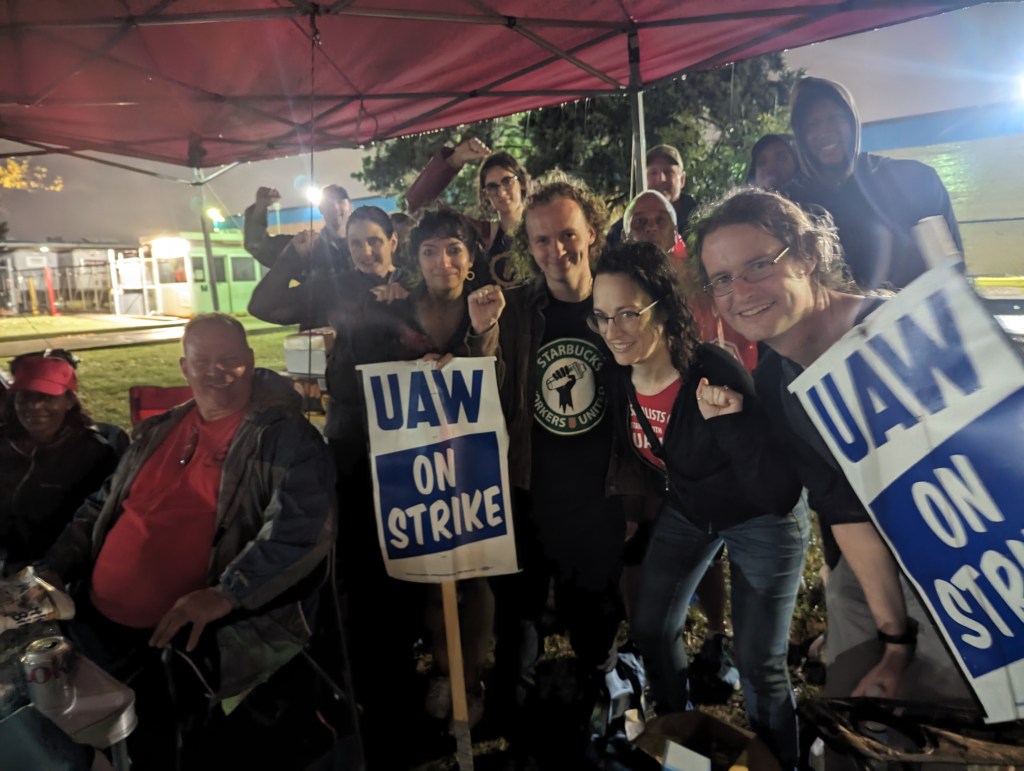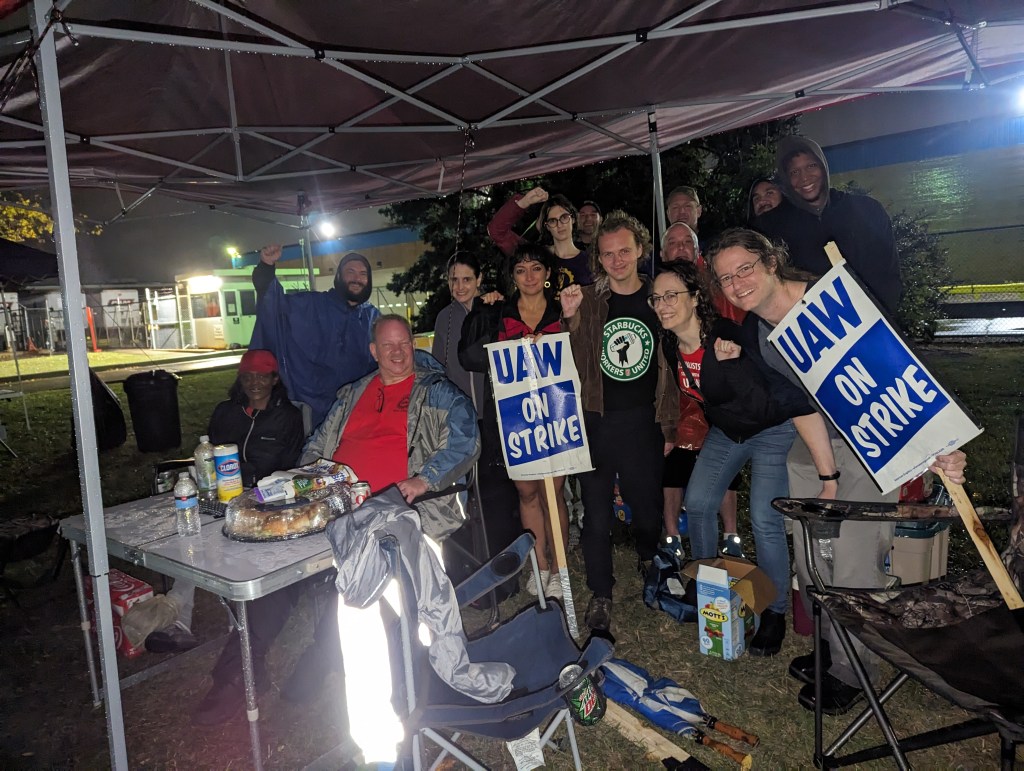


By Sofia D., Red Phoenix correspondent, Minnesota.
Since Sep. 15, thousands of United Auto Workers (UAW) nationwide have been on strike against General Motors, Ford, and Stellantis, demanding higher wages and benefits. On Sep. 23, a Red Phoenix correspondent joined UAW on the picket line at Stellantis’ Mopar Parts Distribution Center in Plymouth, Minnesota, and interviewed one of the workers.
Red Phoenix: All right, would you mind just identifying yourself?
Alex: I’m Alex Tivis, I’m a local UAW union Local 125 worker.
RP: What motivated this strike?
A: I think that what’s really going on here is that back in 2008 and 2009, when we went through the recession, the upper tier of our union gave a lot of concessions to the Big Three to allow them to stay afloat. I think a really big part of this fight, is that they’re asking for a lot of those things back, not only for themselves but also for all the lower tiered UAW employees.
RP: What are some of those concessions?
A: So, the big three things that got frozen or taken away in 2009 are: (1) the cost of living adjustment (COLA); (2) tiered wage scales — what that means is that you will have people in the same facility doing the same work and there will be different scales of pay for them depending on their seniority; and (3) pension increase for retirement or retired UAW workers.
RP: To be clear these were all things the union was fighting for, correct?
A: Yes, correct. Those were all given up as concessions in 2009 to allow the companies to continue to be profitable and continue to function.
RP: I heard from you earlier up at that picket line that the disparities in the pay increases between CEOs and workers have been wildly disproportionate over the past few years.
A: Absolutely. In the public’s eye and in mainstream media, it looks like we’re asking for this huge 40% wage increase, but what that 40% wage increase really incorporates is the lack of increase over the past four contract negotiations. If you break it down into increments, that would basically be right around 12% or 13% per contract. So they’re asking for all of those things back.
This is the wage disparity you are seeing at a ground level here. You have people that are working full-time in these assembly plants, and they actually can’t afford to purchase the vehicles that they’re assembling.
RP: I know up at the picket we were talking about solidarity and how this strike relates to other strikes that have happened recently. Would you like to speak a little to the place of this particular strike in relation to the broader wave of strikes?
A: You know, especially with the showing that we’ve had here, and the amount of other people that are in unions who I’ve been speaking with, I think that the issues are identical across the board. I think that [these issues are] unreasonable working conditions or hours.
RP: How long are your hours right now?
A: So currently here in the Mopar division, they can give us mandatory overtime of one extra hour a day, and then they have the opportunity to give us another eight mandatory hours over the weekend. But depending on necessity, especially in the winter here, because we distribute parts to all of the dealerships, any auto body or collision facilities… If there are any winter storms, it’s basically an emergency for us. So my longest week ever here was around 96 hours.
With that being said, I have some friends that are nurses, and I also think about their stories of being mandated to work an insane amount of hours, having short turnarounds to coming back to work. I think that the thing we are fighting for here, as much as equality of wage, is equality of treatment. When you are someone who lives in a very fast paced environment like that, you definitely need time to decompress. What I’m seeing here is that there’s been this big push by the corporate side of America to make people into machinery, even though they’re not. But when it comes time to compensate those people that were essential to you, making your profits, or when it comes time to pay them more because of the extra work they are putting in, they seem to come up empty-handed.
Yesterday, we had a gentleman from Amazon at the picket line, and again, that is a very similar situation to what we deal with here as far as picking standards, hours of operation, mandatory over time.
I think that this is really a fight for the working class person. I know that that’s something that has really been emphasized by the national side of the UAW, but I think that it really resonates with everyone.
RP: When you start showing that this is a common struggle.
A: Yes. When you start showing up to the grocery store and $60 to $100 buys you a bag or two of groceries? I think that’s a pinch that everybody is feeling.
RP: Absolutely.
A: So it’s definitely a working class issue. All these people that were considered essential when they were shutting things down, who were coming out here, and putting their lives on the line to continue to allow things to function. But now, when it comes time to pay those people for that work, they seem to forget about us.
RP: Were you guys hit by the pandemic in any notable way?
A: We had the option to not work. But the reality, especially for us, is that, in our facility here especially, there’s a lot of generational employees here. I’m a second generation UAW worker – my dad works here. This is a really close-knit group of people. So, especially when you’re considered essential, we do feel an obligation to continue to work.
RP: And there’s enough trust. I think that also creates a lot of solidarity when it comes to union work.
A: I think that you are seeing that. We’re not a lot here, but I do believe that we’re mighty in our own right.
RP: Absolutely.
A: And I think that the effect that that had on us here is that you really started to realize how crucial you were to the overall movement in this company. And I think that a lot of the people, Starbucks workers, Amazon workers, and nurses — we relied on them more than anybody — they felt that pitch, in order to either get these bonuses or temporary increases.
But I know some companies actually took them away after the emergency part of the pandemic was over. I think that’s just absolutely insulting to the people that you rely on.
RP: Is there anything else you’d like to add?
A: I would like to say this: there’s a lot of heritage that goes into the unions, not just the UAW. This is a fight that people a long time before us took up and a lot of things that we get to take advantage of today are things that those people fought for.
This is not an easy battle, but it is a good battle to be part of and even if you don’t want to agree in the here and now, I do believe that everyone should want to leave things better than they found them, that’s really what this is about.
Categories: Labor, U.S. News, Workers Struggle

 Union workers in solidarity: “We’re all fighting for the same thing”
Union workers in solidarity: “We’re all fighting for the same thing”  Workers, migrants, women join forces at Peoples’ Summit to oppose APEC
Workers, migrants, women join forces at Peoples’ Summit to oppose APEC  U.S. Supreme Court undermines power of organized labor
U.S. Supreme Court undermines power of organized labor  Indigenous people of Sumatra protest P&G deforestation at Ohio May Day
Indigenous people of Sumatra protest P&G deforestation at Ohio May Day